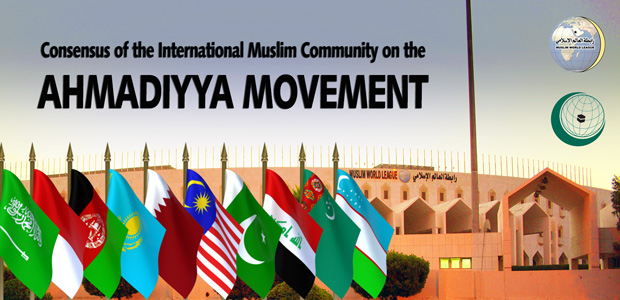Resolution of the Muslim World League Islamic Fiqh Academy
The Ruling on Qadianism and Affiliation with it
All praise and thanks be to God, and may peace and blessings be upon the Messenger, his family, his companions and those who follow his guidance.
The Council of the Islamic Fiqh Academy has examined the matter of the Qadiani sect, which appeared in India in the nineteenth century CE, and which is also known as the Ahmadiyya Movement. The Council has studied the beliefs of this sect as proclaimed by its founder, Mirza Ghulam Ahmad who established it in 1876 C.E. He claimed that:
- he was a prophet of God who received divine revelation
- he was the Promised Messiah Jesus, the Son of Mary (peace be upon him)
- prophethood has not ended with the coming of Prophet Muhammad, the Prophet of Islam (peace be upon him) contrary to the belief of the Muslims and the clear texts of the Qur’aan and the Sunnah
- he was divinely inspired with more than ten thousand verses were revealed to him
- whoever belies him is a disbeliever
- Muslims should make pilgrimage to Qadian, that it is a sacred land like Makkah and Madinah and that it is the place referred to in the Qur’aan as al-Masjid-ul-Aqsaa.
All of this is declared in his book entitled Baraaheen Ahmadiyyah and in his treatise At-Tableegh.
The Council of the Fiqh Academy also examined the statements of Mirza Basheer-ud-Din, Ghulam Ahmad’s son and successor, including what he wrote in his book Ayena-e-Sadaaqat (p.35):
He is also quoted in the Qadiani periodical, Al-Fazl (30th July 1931) as reporting from his father, Ghulam Ahmad himself that he said:
In the same periodical (Vol.3) it is declared:
“Verily, Mirza is the Prophet Muhammad (peace be upon him),” claiming that he was the fulfilment of the prophecy of Prophet Jesus (peace be upon him) as quoted in the Qur’aan (61:6 - which means):
“…giving glad tidings of a Messenger to come after me, whose name shall be Ahmad.”
(Indhaar-ul-Khilaafah, p.21)
The Council also examined the research carried out by Islamic scholars and reliable Muslim authors about the Qadiani Ahmadiyya sect clarifying that they are completely outside the fold of Islam.
Based upon this, the Parliamentary Territorial Committee which established the northern borders of the State of Pakistan in 1974 C.E. - by unanimous agreement of its members - declared in its resolution that the Qadiani sect are a non-Muslim minority among the citizens of Pakistan. In the National Assembly of the Pakistan National Council for all Provinces, all of its members also agreed that the Qadianis are a non-Muslim minority.
In addition to their aforementioned beliefs, it has been clearly proven from the writings of Mirza Ghulam Ahmad himself and through the abundant and continuous letters which he wrote to the British Government in India displaying his support and affection for them, that he declared that jihaad was forbidden and that his denial of the concept of jihaad was in order to inspire loyalty in the hearts of Muslims towards the Colonial British Government in India. He declared that the concept of jihaad which some ignorant Muslims professed, prevented them from expressing loyalty to the British. In this regard, he said in the appendix of his book Shahaadat-ul-Qur’aan (p. 17, 6th ed.):
“I firmly believe that as my followers increase, the number of those who believe in jihaad will decrease, because the belief that I am the Messiah or the Mahdee necessitates the rejection of jihaad.”
(Cf. Qadianism: A Critical Study, p.25, by Abul-Hasan Ali Nadwi. Published by the Muslim World League.)
Having studied these documents and numerous others like them which shed light on the creed of the Qadianis, as well as the sources it springs from, its foundations and its dangerous aims which include undermining the correct Islamic creed and diverting Muslims away from it, the Council has unanimously passed the following resolutions:
- the beliefs of the Qadianis, also known as the Ahmadiyya, are completely outside the fold of Islam
- those who accept their creed are considered apostates and non-Muslims, and
- the claim of its followers that they are Muslims is no more than an attempt to misguide and deceive.
The Council of the Fiqh Academy also declares that it is incumbent upon Muslims - governments, scholars, writers, thinkers, preachers and all others - to oppose this heretical sect and its followers all over the world.
And it is God who grants success.
Signed:
President:
‘Abdullaah ibn Humaid
(Chief Justice of Saudi Arabia and Imaam of al-Masjid-ul-Haraam)
Vice President:
Muhammad ‘Alee al-Harakaan
(Secretary General of the Muslim World League)
Members:
‘Abd-ul-‘Azeez ibn Baaz
(Grand Muftee of Saudi Arabia)
Muhammad ibn Saalih ibn ‘Uthaymeen
Muhammad Rasheed Qabbaanee
Muhammad Rasheedee
Muhammad Mahmood as-Sawwaaf
Muhammad ibn ‘Abdillaah as-Subayyil
Mustafaa az-Zarqaa’
‘Abd-ul-Quddoos al-Hashimee an-Nadwee
Aboo Bakr Joomee
Published in Majallat-ul-Buhooth-il-Islaameeyah (Issue #26, pp.331-333).
Resolution of the OIC Islamic Fiqh Academy

In the Name of Allaah, the Entirely Merciful, the Especially Merciful
Praise be to Allaah, Lord of the worlds, and peace and blessings be on Muhammad, the last of the prophets, and on his family and his companions.
Resolution #4: Concerning Qadianism
The Council of the International Islamic Fiqh Academy, which is a subsidiary of the Organisation of Islamic Cooperation, during its second session, held in Jeddah, Saudi Arabia, from 10th to 16th Rabee‘-uth-Thaanee, 1406 AH (22nd-28th December, 1985 CE);
Having looked into the question submitted to it by the Muslim Judicial Council, Cape Town, South Africa about the Islamic ruling concerning the Qadianis and its off-shoot, who call themselves Lahoris, and whether to consider them as Muslims or otherwise, and whether it is correct for a non-Muslim to arbitrate in such an issue;
In light of the research and documents presented to the Academy’s members related to this issue and about Mirza Ghulam Ahmad al-Qadiani who appeared in India in the last century to whom the Qadiani and Lahori sects are attributed;
Having carefully considered the information presented concerning these two groups and after having verified that:
- Mirza Ghulam Ahmad did indeed declare to be a prophet sent by God and revealed upon, such claim having been established about him through his writings some of which he claimed are part of the divine revelation which he received;
- he had continued to proclaim such a status all his life, inviting people through his books and speeches to believe that he was a prophet and messenger of God
- he denied many of the obvious aspects of Islam such as jihaad;
Having further considered the resolution of the (MWL) Islamic Fiqh Academy in Makkah al-Mukarramah on this same issue;
resolves the following:
-
The claim of Mirza Ghulam Ahmad of being a prophet and messenger of God and his claim of receiving divine revelation is an open rejection of the categorically established belief which is known to every Muslim by necessity that prophethood ended with Prophet Muhammad (peace be upon him) and that no divine revelation shall descend on anyone after him. Therefore, Mirza Ghulam Ahmad’s aforementioned claim make him, along with all those who accept the same, apostates who are outside the fold of Islam.
As far as the Lahoris are concerned, they are also apostates like the Qadianis despite their description of Mirza Ghulam Ahmad as a shadow, reflection, manifestation or incarnation of Prophet Muhammad (peace be upon him).
-
No non-Islamic court or non-Muslim judge is entitled to pass judgement about someone being a Muslim or having apostatised, particularly so when it is in defiance of the consensus of the Muslim community as represented by its academies and religious scholars. This is so because any judgement concerning Islam or apostasy would be unacceptable unless it is issued by a Muslim:
- who knows all the prerequisites for entering into Islam as well as leaving its fold as an apostate
- who has grasp of the essence of Islam as well as what constitutes disbelief and
- who possesses in-depth knowledge of what is proven by the Qur’aan, the authentic Hadeeth and the consensus of Muslim scholars.
Therefore, the decision of a non-Islamic court such as the one in question is false and void.
Verily, Allaah is All-Knowing
Published in the Academy’s journal Majallat-ul-Majma‘ (Issue #2, Vol.1, p.209).



Subscribe
Join our mailing list to get notified about Masjid activities and events.
You have Successfully Subscribed!